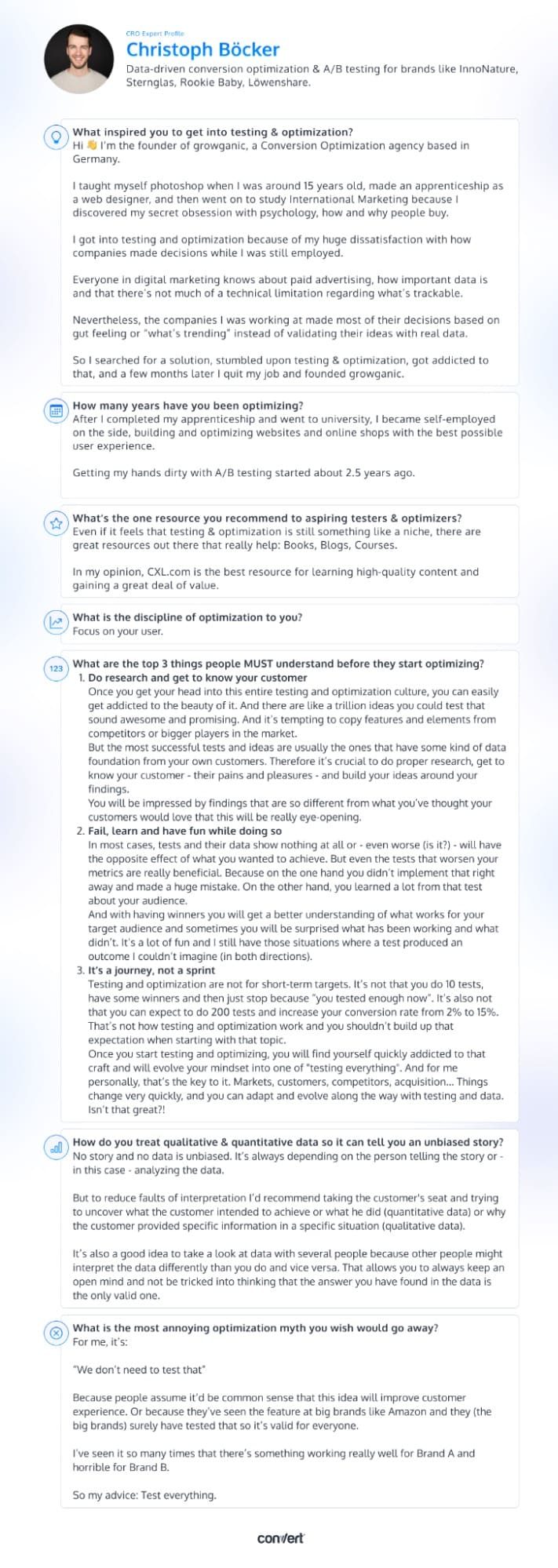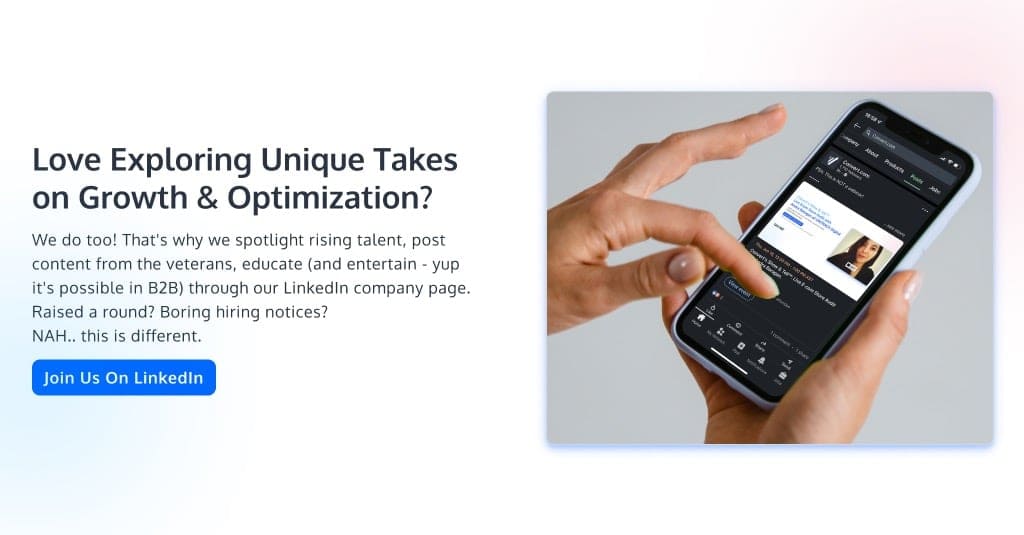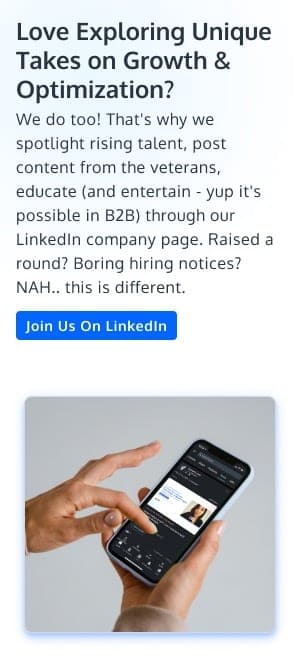Testing Mind Map Series: How to Think Like a CRO Pro (Part 26)

Interview with Christoph Böcker
Christoph Böcker’s key advice for fellow optimizers: get to know your customers and use that data as a foundation for successful tests and ideas.
Don’t be afraid to fail, learn, and have fun along the way.
Optimization is a long-term game, so keep at it and don’t settle for quick gains. Christoph says the key is to embrace the mindset of “testing everything” and never stop learning, adapting, and improving.
He challenges the notion that testing is only for achieving short-term targets, instead advocating for a never-ending pursuit of improvement. Get ready to have your mind blown by his insights.
Let’s dive in…
Christoph, tell us about yourself. What inspired you to get into testing & optimization?
Hi 👋 I’m the founder of growganic, a Conversion Optimization agency based in Germany.
I taught myself photoshop when I was around 15 years old, made an apprenticeship as a web designer, and then went on to study International Marketing because I discovered my secret obsession with psychology, how and why people buy.
I got into testing and optimization because of my huge dissatisfaction with how companies made decisions while I was still employed.
Everyone in digital marketing knows about paid advertising, how important data is and that there’s not much of a technical limitation regarding what’s trackable.
Nevertheless, the companies I was working at made most of their decisions based on gut feeling or “what’s trending” instead of validating their ideas with real data.
So I searched for a solution, stumbled upon testing & optimization, got addicted to that, and a few months later I quit my job and founded growganic.
How many years have you been optimizing?
After I completed my apprenticeship and went to university, I became self-employed on the side, building and optimizing websites and online shops with the best possible user experience.
Getting my hands dirty with A/B testing started about 2.5 years ago.
What’s the one resource you recommend to aspiring testers & optimizers?
Even if it feels that testing & optimization is still something like a niche, there are great resources out there that really help: Books, Blogs, Courses.
In my opinion, CXL.com is the best resource for learning high-quality content and gaining a great deal of value.
Answer in 5 words or less: What is the discipline of optimization to you?
Focus on your user.
What are the top 3 things people MUST understand before they start optimizing?
- Do research and get to know your customer
Once you get your head into this entire testing and optimization culture, you can easily get addicted to the beauty of it. And there are like a trillion ideas you could test that sound awesome and promising. And it’s tempting to copy features and elements from competitors or bigger players in the market.
But the most successful tests and ideas are usually the ones that have some kind of data foundation from your own customers. Therefore it’s crucial to do proper research, get to know your customer – their pains and pleasures – and build your ideas around your findings.
You will be impressed by findings that are so different from what you’ve thought your customers would love that this will be really eye-opening.
- Fail, learn and have fun while doing so
In most cases, tests and their data show nothing at all or – even worse (is it?) – will have the opposite effect of what you wanted to achieve. But even the tests that worsen your metrics are really beneficial. Because on the one hand you didn’t implement that right away and made a huge mistake. On the other hand, you learned a lot from that test about your audience.
And with having winners you will get a better understanding of what works for your target audience and sometimes you will be surprised what has been working and what didn’t. It’s a lot of fun and I still have those situations where a test produced an outcome I couldn’t imagine (in both directions). - It’s a journey, not a sprint
Testing and optimization are not for short-term targets. It’s not that you do 10 tests, have some winners and then just stop because “you tested enough now”. It’s also not that you can expect to do 200 tests and increase your conversion rate from 2% to 15%. That’s not how testing and optimization work and you shouldn’t build up that expectation when starting with that topic.
Once you start testing and optimizing, you will find yourself quickly addicted to that craft and will evolve your mindset into one of “testing everything”. And for me personally, that’s the key to it. Markets, customers, competitors, acquisition… Things change very quickly, and you can adapt and evolve along the way with testing and data. Isn’t that great?!
How do you treat qualitative & quantitative data so it tells an unbiased story?
No story and no data is unbiased. It’s always depending on the person telling the story or – in this case – analyzing the data.
But to reduce faults of interpretation I’d recommend taking the customer’s seat and trying to uncover what the customer intended to achieve or what he did (quantitative data) or why the customer provided specific information in a specific situation (qualitative data).
It’s also a good idea to take a look at data with several people because other people might interpret the data differently than you do and vice versa. That allows you to always keep an open mind and not be tricked into thinking that the answer you have found in the data is the only valid one.
What is the most annoying optimization myth you wish would go away?
For me, it’s:
“We don’t need to test that”
Because people assume it’d be common sense that this idea will improve customer experience. Or because they’ve seen the feature at big brands like Amazon and they (the big brands) surely have tested that so it’s valid for everyone.
I’ve seen it so many times that there’s something working really well for Brand A and horrible for Brand B.
So my advice: Test everything.
Download the infographic above and add it to your swipe file for a little dose of inspiration when you’re feeling stuck!
Christoph’s insights into the world of CRO have been nothing short of refreshing and eye-opening. We hope this interview has given you some valuable insights and advice on how to experiment more effectively.
What advice resonated most with you?
Check back twice a month for upcoming interviews! And if you haven’t already, check out our past interviews with CRO legends Gursimran Gujral, Haley Carpenter, Rishi Rawat, Sina Fak, Eden Bidani, Jakub Linowski, Shiva Manjunath, Deborah O’Malley, Andra Baragan, Rich Page, Ruben de Boer, Abi Hough, Alex Birkett, John Ostrowski, Ryan Levander, Ryan Thomas, Bhavik Patel, Siobhan Solberg, Tim Mehta, Rommil Santiago, Steph Le Prevost, Nils Koppelmann, Danielle Schwolow, Kevin Szpak, and our latest with Marianne Stjernvall.



